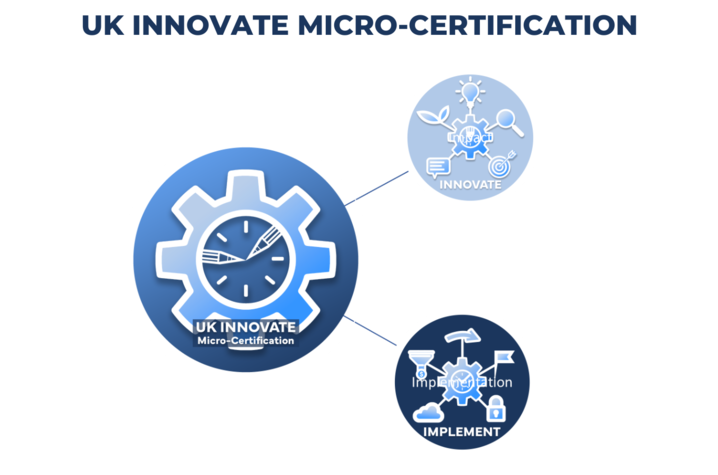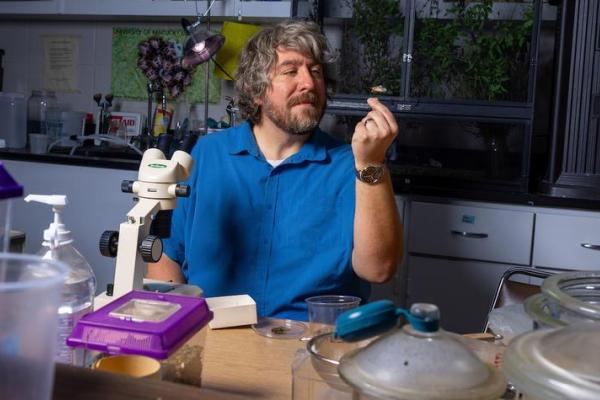UK Innovate launches micro-certification training program

This month UK Innovate launches a micro-certification training program that uses experiential design theory and mentorship programming to support University of Kentucky researchers, staff and students’ role in contributing not only to science but also to the impact of that science on society and the economy.
Studying and benchmarking successful innovation training courses worldwide, Christine Wildes, Ph.D., associate director of innovation training in UK Innovate, developed and leads this program. The micro-certification uses a badging system to indicate and share successful knowledge attainment related to research impact and entrepreneurial innovation.
The objectives of the program are to help UK faculty 1) understand the evolution of the university researcher and research impact on the economy and society, 2) learn the design thinking process connecting research and innovation impact by tackling unique challenges — from ideas to validation — through use-inspired steps, and 3) apply design thinking methods to propose human-centered approaches to problem-solving for unmet societal or economic needs.
The micro-certification is divided into two focus areas: Impact and Implementation. Participants can choose to take as few or many courses as they want or complete each track.
The Impact track provides the following workshops:
- Explore Growth Mindset — Oct. 18;
- Building Impact Research — Oct. 25;
- Impact Design Plan — Oct. 27;
- Engaging Stakeholders — Nov. 1; and
- The Entrepreneurial Research Ecosystem — Nov. 3.
The Implementation track provides the following workshops:
- The Idea to Enterprise Strategy — Nov. 8;
- Protecting Your Idea, Before and After Validation — Nov. 10;
- Commercialization in Education, Social Sciences, Humanities and Arts — Nov. 15;
- Who’s Writing the Checks?— Nov. 17; and
- Data in Today and Tomorrow’s Companies — Nov. 29.
The curriculum consists of the first section of the course being a synchronous 45 minutes followed by a module or two completed asynchronously within 30 days. The curriculum is for the new or experienced researcher or faculty member (who wants to build competitive research skillsets and attain a micro-certification), the future learner (who doesn't want to commit to a long-term program but wants to take advantage of stackable element for skills) or the current graduate or postdoctoral scholar (who is interested in gaining practical skills and knowledge to increase the impact potential related to future research and innovation career opportunities).
“The Innovation Training program now offered by UK Innovate is an investment in the research impact culture at UK and in the future competitiveness of UK researchers to win use-inspired research funding awards and successfully produce impactful innovation results from their efforts as investigators,” said Ian McClure, associate vice president for research, innovation and economic impact and executive director of UK Innovate. “There is an evolution occurring in university research, and we want to provide opportunities for our researchers to be equipped with the knowledge and entrepreneurial skills necessary to optimize the potential for research impact on society.”
“This program provides you with the opportunity to investigate and expand the potential impact of your research and concepts,” Wildes said. “The exciting element is that each participant will be recognized for their accomplishments by being awarded a unique digital badge. Digital badges are shareable images representing the participant’s accomplishment or skill achievements. This is about career development, recognition and building an innovation culture.”
You can register for courses here before the first course begins Oct. 18.
UK Innovate at the University of Kentucky is the innovation, entrepreneurship and economic enterprise for University of Kentucky Research. Through technology commercialization, corporate partnerships, social innovation, innovation training and economic development initiatives related to UK’s research innovations, talent and community, UK Innovate works to move ideas into the world faster, where they can make the greatest social and economic impact possible. Learn more at www.research.uky.edu/ukinnovate.
Credits
Jacqueline Green (UK Innovate)

